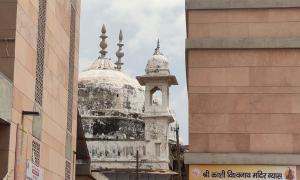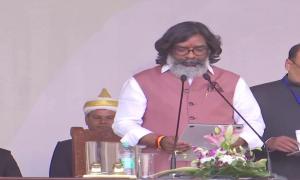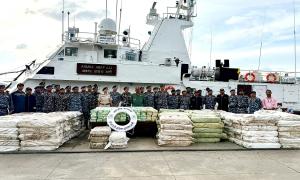"Who is going to capture him and where?" Jamal Khalifa, who now runs a restaurant near the port city of Jeddah, asked CNN in an exclusive interview.
"For 10 years, the Russians did not capture even one leader of the Afghan mujahedeen with the full forces everywhere. So I think it is a little bit difficult," he said.
"Ten years we are together," said Khalifa, who met Bin Laden at Jeddah's King Abdulaziz University in the late 1970s. They soon became inseparable friends, he told CNN.
"When we were in the university and after that. Always we are together. We live in one house."
Their teacher, Abdullah Azzam, a Palestinian cleric who later joined bin Laden as one of the founders of al Qaeda, influenced bin Laden and Khalifa to go to Afghanistan and join the jihad against the Soviet forces that had invaded that country in 1979, CNN said. Azzam later died in mysterious circumstances.
"He (Osama) is the one who suggested ... I marry his sister," Khalifa told CNN.
"I told him, 'Osama, we are going to die and you are talking about marriage. So let's go first and if I come alive, we will do it.' So, I came alive."
While Khalifa spent most of his time in Pakistan where he set up an Islamic relief charity for Afghan refugees, bin Laden became a leader of Arabs who came to Pakistan and Afghanistan, and used some of his family fortune and contacts to raise money for the jihad, Khalifa said.
"I saw him starting to group the Arabs in one place and start to let them go and fight by themselves."
In the late 1980s, Khalifa said he had a visit from three men, including Abu Ubaidah and Abu Hafs, who later became al Qaeda's first two military commanders. He realized later that he was being screened as a potential Al Qaeda candidate.
UAE royals bin Laden' s saviours
"I am the first one who stood up in front of Osama and told him, 'Osama, you are doing something wrong. You are going to the wrong direction,'" said Khalifa, who said he disapproved of the worldwide jihad that bin Laden and his advisers were planning.
"He is a wealthy man, he has very good connections, and many people really love Osama," Khalifa told CNN. He said they parted company in the late 1980s, but remained in touch, and he last saw bin Laden in early 1992 during a family visit to Sudan.
Cleric says he gave $20 million to Osama
The bin Laden Khalifa saw on a video recently aired on Arabic-language news channelswhere he again took responsibility for the 9/11 attacks on the US --- looks like a man who has aged a great deal, he said.
Khalifa says his brother-in-law may have led the attacks, but was not the organizer.
"He cannot organize anything. I am the one who is leading. I am the one who is leading him in the prayer. I am the one who is leading if we go for outing, for picnic, for riding horses," he said with a laugh.
Last year, after a spate of terrorist attacks in Saudi Arabia, Khalifa published an open letter to bin Laden in a Saudi paper, asking him to renounce the terrorism being committed in his name, said CNN.
"Please come out, tell those people to stop," he wrote. "You are the one who can tell that, and you are the one who can stop it."
He never got a response, and the attacks continued, CNN said.
Continue jihad, bin Laden urges Muslims
Because of his background, Khalifa has been under the scanner of almost every security agency of the world.
When he went to the Philippines from Afghanistan, officials accused him of using Islamic charities to funnel money to terrorists. Much of the investigation took place after Khalifa had left the country, and no charges were filed, said CNN
When he arrived in San Francisco from the Philippines, Khalifa was arrested and deported to Jordan, where he had been convicted in absentia on a charge of plotting to overthrow the government, said CNN. But he was acquitted after a retrial there.
' Although Khalifa is named as a defendant in a multibillion-dollar lawsuit brought by the families of 9/11 victims, he contends there is no evidence to link him to the attacks,' CNN said.
Complete coverage: America's War on Terror








More from rediff